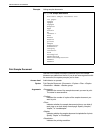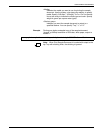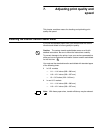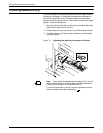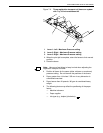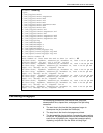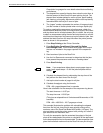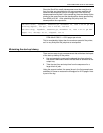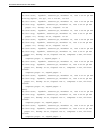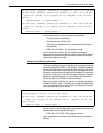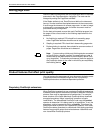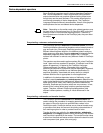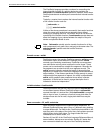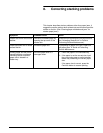
ADJUSTING PRINT QUALITY AND SPEED
7-6 XEROX DOCUPRINT 96/4635/180 NPS TROUBLESHOOTING GUIDE
Description Languages for more details about factors affecting
performance.
• The elapsed time, equal to the stop time minus the start time, is
the total amount of time DocuPrint spent printing the job. The
elapsed time includes delays for warm-up time, paper loading,
jam clearing, print quality adjustments and the start-up latency
associated with the first job in a set of jobs.
• The “pages” number represents the number of images printed,
(not the number of sheets printed when running a duplex job).
To make a meaningful measurement of performance, obtain the
measurements while the printer is running a block of jobs. Since start
and stop times tend to overlap between jobs in a block, the only way
to obtain a measurement using the start and stop times is to use the
start time when the printer first powers up to print a block of jobs, then
subtract that start time from the stop time when the printer powers
down as shown in this procedure:
1. Enter Stop Printing at the Printer Controller.
2. Enter Set Option ForceReport False and Set Option
UseTitlePage False. This to avoids extra pages in the output
that are not included in the pages reported in the sequencer
log.
3. Send a series of jobs to the DocuPrint.
4. Use the List Documents command to determine that the jobs
have passed the prescanner and have a Pending status.
5. Enter Start Printing.
Note: If you experience delays due to empty paper trays or
paper jams, repeat steps 1-5 until the jobs complete without
delays.
6. Calculate the elapsed time by subtracting the stop time of the
last job from the start time of the first job.
7. Add up the total number of pages for all jobs.
8. Calculate throughput using the formula:
PPM = 60 x pages/elapsed time in seconds
Here is the calculation for the example of the sequencer log above:
The start time was: 1:16:57 pm
The stop time was: 1:25:35 pm
(This gives an elapsed time of 8 minutes and 38 seconds, or 518
seconds)
PPM = 60 x 1085/518 = 125.7 pages per minute
This example illustrates the problem with calculating the elapsed
time from the first job, since this job was actually printing at the
maximum rate of the DocuPrint Model 4635 printer (135 ppm). The
start-up latency made the printer appear to be printing at a rate 6.2
ppm lower than the maximum rate.
To verify the assumption that the sustained throughput of the job
prints at the rated speed of the printer, a calculation of the rate based
on the decomposition time is recommended. The decomposition time
gives the theoretical maximum that the DocuPrint can print this job.



